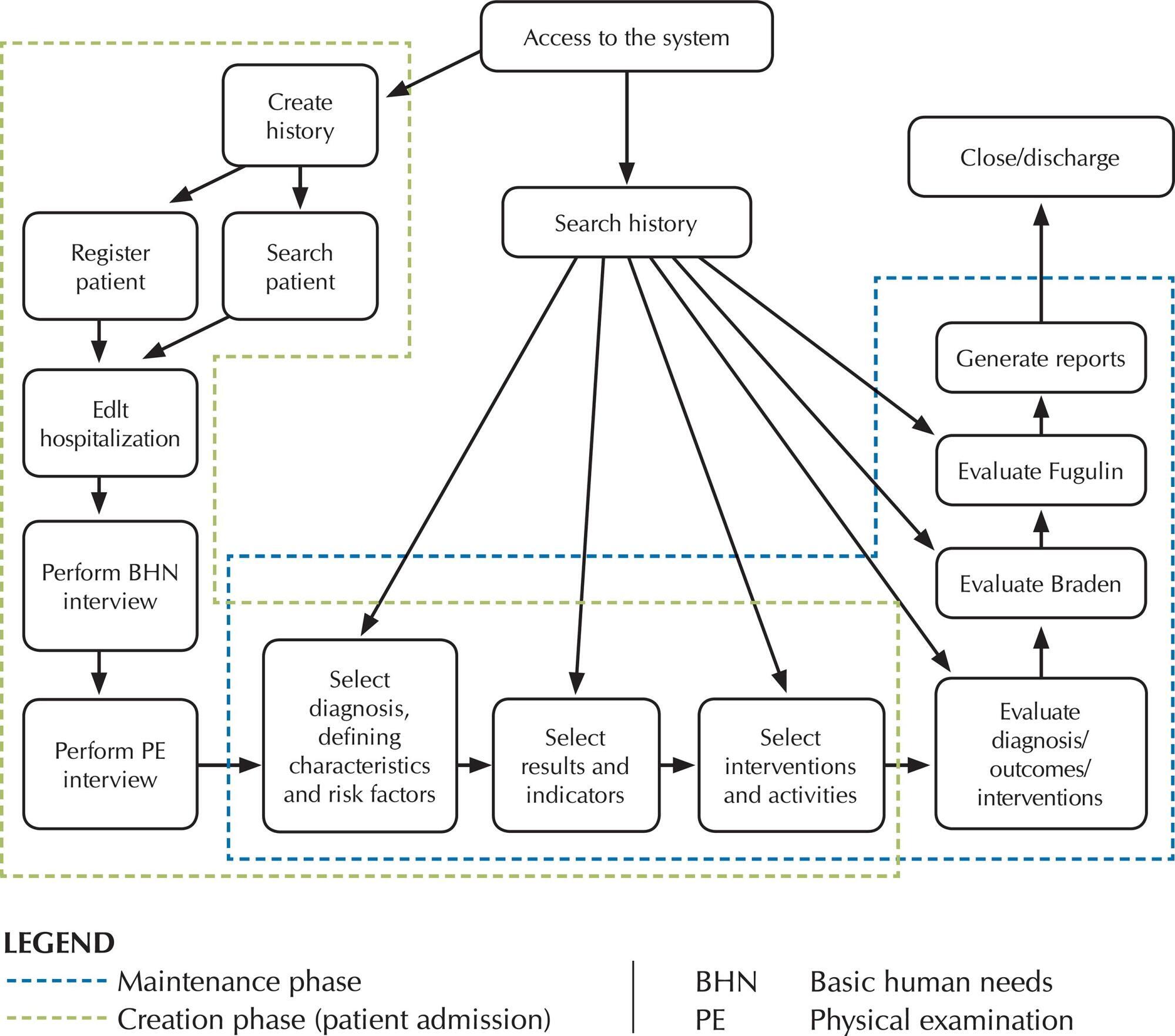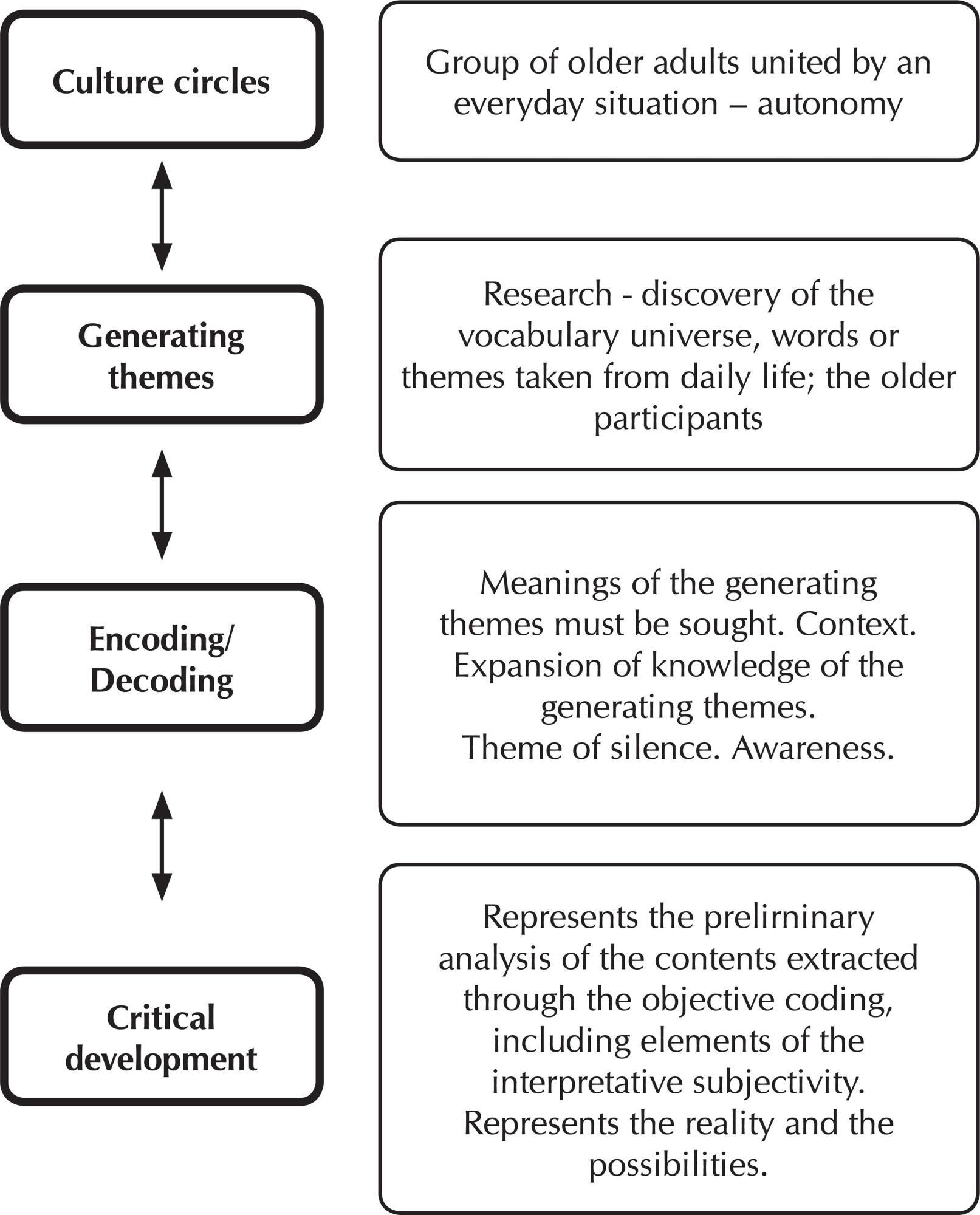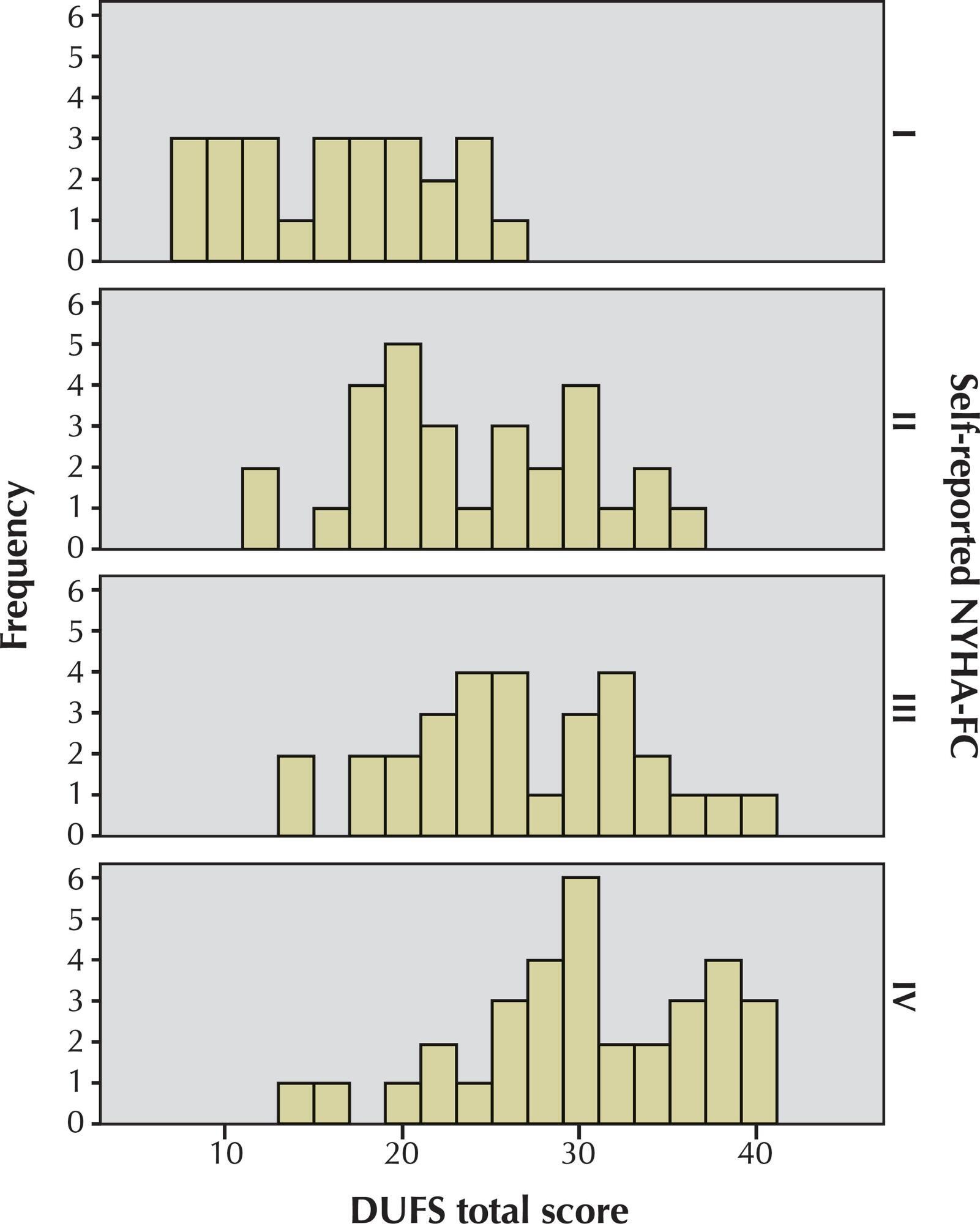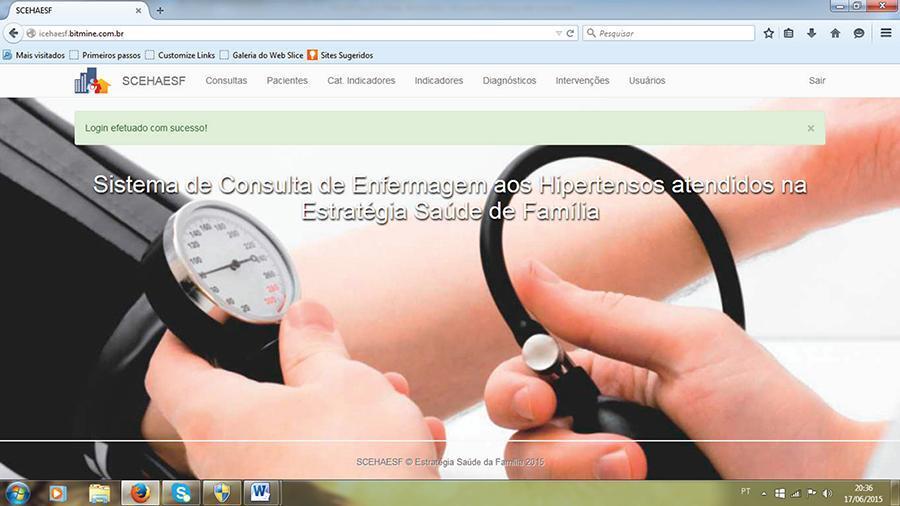-
RESEARCH01-01-2018
Software for systematization of nursing care in medical units
Revista Brasileira de Enfermagem. 2018;71(5):2425-2431
Abstract
RESEARCHSoftware for systematization of nursing care in medical units
Revista Brasileira de Enfermagem. 2018;71(5):2425-2431
DOI 10.1590/0034-7167-2016-0386
Views0See moreABSTRACT
Objective:
To describe the development of a software prototype to apply the nursing process in clinical units of a general hospital, and assess its usefulness.
Method:
Applied methodological research of technological production of a program based on prototyping software engineering developed in three stages: specification, development, and validation.
Results:
Produced under the name of INFOSAE, the system represents a set of stages (history, diagnosis, expected outcomes, and nursing intervention) providing guidance to nurses to direct and guarantee the necessary care to patients, also allowing an assessment of this care.
Conclusion:
The INFOSAE software prototype, an easy-to-use computerized technology, obtained a favorable assessment by the user nurses that participated in the whole development process, from the specification to the validation of the system.

-
RESEARCH01-01-2018
Self-care of men with priapism and sickle cell disease
Revista Brasileira de Enfermagem. 2018;71(5):2418-2424
Abstract
RESEARCHSelf-care of men with priapism and sickle cell disease
Revista Brasileira de Enfermagem. 2018;71(5):2418-2424
DOI 10.1590/0034-7167-2017-0464
Views0See moreABSTRACT
Objective:
To identify self-care demands of men with sickle cell disease and priapism and describe self-care measures in light of Orem’s Self-Care Theory.
Method:
This is a descriptive exploratory study with qualitative approach conducted with nine men with a history of sickle cell disease and priapism. Data were analyzed using Orem’s Self-Care Theory.
Results:
Some demands were identified: from universal self-care – difficulty in social interaction and solitude, changes in self-image, self-esteem and sexual activity; from development – the experience with priapism and little knowledge about the pathophysiology of the disease; regarding health deviations – pain crises.
Conclusion:
Orem’s theory allowed to identify self-care demands, which are essential for the nursing care provided for men with priapism. Nursing has an essential role in the measures for the different demands presented.
-
RESEARCH01-01-2018
Promoting the autonomy of rural older adults in active aging
Revista Brasileira de Enfermagem. 2018;71(5):2411-2417
Abstract
RESEARCHPromoting the autonomy of rural older adults in active aging
Revista Brasileira de Enfermagem. 2018;71(5):2411-2417
DOI 10.1590/0034-7167-2017-0570
Views0See moreABSTRACT
Objective:
to understand how the rural older adults promote their autonomy in active aging.
Method:
qualitative research through the Paulo Freire’s research itinerary, consisting of three steps: area of research; encoding and decoding; and critical unveiling. Seventeen older adults living in the rural area of a municipality in Southern Brazil participated in the research. Six culture circles were conducted from July to December 2016.
Results:
the investigation revealed two generating themes: joint pain and participation in groups. The understanding of autonomy promotion for the active aging of older adults is focused on the physical capacity and independence of activities of daily living.
Final considerations:
the culture circles have promoted reflection moments for the participants, especially about the advantages and difficulties related to the practice of autonomy in the exercise of citizenship for active aging in the rural area.

-
RESEARCH01-01-2018
Comparison of tools for assessing fatigue in patients with heart failure
Revista Brasileira de Enfermagem. 2018;71(5):2404-2410
Abstract
RESEARCHComparison of tools for assessing fatigue in patients with heart failure
Revista Brasileira de Enfermagem. 2018;71(5):2404-2410
DOI 10.1590/0034-7167-2017-0083
Views0See moreABSTRACT
Objective:
To compare the distributions of measurements of the Dutch Fatigue Scale (DUFS), Dutch Exertion Fatigue Scale (DEFS), and Fatigue Pictogram tools, according to the New York Heart Association (NYHA) Functional Classification and left ventricular ejection fraction (LVEF).
Method:
Methodological, cross-sectional study with 118 patients with heart failure. Variance analysis, Pearson’s correlation, and Fisher’s exact tests were carried out, with a significance level of 0.05.
Results:
There was an increase in the DUFS and DEFS means with worsening of the NYHA-FC (p<0.001, for both tools). Correlations among the LVEF resulted in positive and weak magnitude for the DEFS (r=0.18; p=0.05) and for the DUFS (r=0.16; p=0.08). Just the item A on the Fatigue Pictogram had an association with the NYHA-FC (p<0.001) and the LVEF (p=0.03).
Conclusion:
Three tools detected worsening in fatigue levels according to the illness severity assessed by the NYHA-FC.

-
RESEARCH01-01-2018
Nursing consultation software for hypertensive users of the Family Health Strategy
Revista Brasileira de Enfermagem. 2018;71(5):2398-2403
Abstract
RESEARCHNursing consultation software for hypertensive users of the Family Health Strategy
Revista Brasileira de Enfermagem. 2018;71(5):2398-2403
DOI 10.1590/0034-7167-2017-0174
Views0See moreABSTRACT
Objective:
To report the development of a nursing consultation software for hypertensive users of the Family Health Strategy.
Method:
Applied methodological research based on Roger Pressman’s Software Engineering, developed in three cycles: planning, composed of the definition of the database prototyping and modelling; development of the navigation interface; and development of functional expressions and programming.
Result:
The software consists of administrative and nursing consultation screens. In the history, there is the option of undertaking the first and next consultation; nursing diagnoses are suggested by the system after entering information and can be selected by nurses. Interventions for diagnoses are suggested and can be chosen by nurses after structuring the medical plan.
Conclusion:
It is believed that the introduction of computer technology for nursing consultation brings several contributions, such as standardization, integration with different information systems, and continuous update.

-
RESEARCH01-01-2018
Being-patient-waiting-for-cardiac-surgery: the preoperative period under the Heideggerian perspective
Revista Brasileira de Enfermagem. 2018;71(5):2392-2397
Abstract
RESEARCHBeing-patient-waiting-for-cardiac-surgery: the preoperative period under the Heideggerian perspective
Revista Brasileira de Enfermagem. 2018;71(5):2392-2397
DOI 10.1590/0034-7167-2017-0506
Views0See moreABSTRACT
Objective:
to investigate the patients’ experience in the cardiac surgery preoperative period under the Heideggerian perspective.
Method:
exploratory qualitative research. Twelve patients were interviewed, from March to April, 2016, while they waited for myocardial revascularization surgery or valve replacement surgery.
Results:
the analysis of the speeches allowed finding two dimensions of the being-there-patient-waiting-for-cardiac surgery, two meanings of the beingness: being-there-in-a-reduced-world and being-there-in-a-unknown-world.
Conclusion:
the experiences were related to alterations and limitations coming from the surgery, potential generators of anxiety, depression and existential conflicts in the cardiac surgery preoperative period. Reinforcing the care as being-with-the-other is suggested, considering the dimensions referred to and the patient’s integrality.
-
RESEARCH01-01-2018
Adaptation of the Nursing Activities Score for oncologic care
Revista Brasileira de Enfermagem. 2018;71(5):2383-2391
Abstract
RESEARCHAdaptation of the Nursing Activities Score for oncologic care
Revista Brasileira de Enfermagem. 2018;71(5):2383-2391
DOI 10.1590/0034-7167-2017-0015
Views0See moreABSTRACT
Objective:
To adapt the contents of the Nursing Activities Score (NAS) tool to assist patients with cancer.
Method:
Methodological research that according to the Delphi Technique is a method aiming at the validation of content through agreement of experts.
Results:
It took two rounds of opinion of experts, which added content contributions without modifying the structure and score of the original tool. The level of agreement ranged from 71 to 86%, and biological factors and assistance were more suggested: Monitoring and controls; Laboratory investigations; Support and care for family members and patients; Intravenous replacement; Renal support; Management activities.
Conclusion:
A high level of complexity of patients with cancer, and the demand for care and biopsychosocial-spiritual care was diagnosed. This tool will enable the measurement of the workload of the Oncology Nursing team, which can contribute to the staffing dimensioning.
-
RESEARCH01-01-2018
Bowel rehabilitation of individuals with spinal cord injury: video production
Revista Brasileira de Enfermagem. 2018;71(5):2376-2382
Abstract
RESEARCHBowel rehabilitation of individuals with spinal cord injury: video production
Revista Brasileira de Enfermagem. 2018;71(5):2376-2382
DOI 10.1590/0034-7167-2017-0283
Views0See moreABSTRACT
Objective:
produce and validate an educational video about bowel emptying maneuvers for training of individuals with neurogenic bowel in bowel rehabilitation process.
Method:
this is a methodological study developed in four stages: script/storyboard production, validation, educational video production and pilot study, which was conducted from January 2013 to July 2015. Instruments for validation, which was performed from December 2014 to February 2015 by a group of experts. A value equal to or greater than 70% was considered for validation of agreement and relevance of the script and storyboard, using descriptive statistics for data analysis.
Results:
the script and storyboard were validated by 94% of the experts in the subject and 100% of the technicians. After validation and video recording, the pilot study was conducted with six individuals with neurogenic bowel – 100% of them evaluated the video positively.
Conclusion:
the video may contribute to the education of individuals with neurogenic bowel.

-
01-01-2015
Quality of life and physical activity in intensive care professionals from middle São Francisco
Revista Brasileira de Enfermagem. 2015;68(1):26-31
Abstract
Quality of life and physical activity in intensive care professionals from middle São Francisco
Revista Brasileira de Enfermagem. 2015;68(1):26-31
DOI 10.1590/0034-7167.2015680104i
Views0See moreObjective:
the objective was to assess the level of physical activity (LPA) and the quality of life QL of the professionals who work in ICU.
Method:
this was a cross-sectional study carried out in Adult ICUs. LPA was assessed by the International Questionnarie of Physical Activity – short form (IQPA-SF) and the QL by the Medical Outcomes Study 36 (SF-36) questionnaire.
Results:
it was classified active 50.89% out of a total of 59 professionals. Nursing technicians were considered the most active with 60.6%. The QL of the professionals who were considered active were better when compared to inactives, with statistical differences to the category of physical aspects limitation, social aspects and mental health. The working hours were higher than recommend, the physicians were higher than the physical therapist, nurses and technicians nurses (p = 0.046).
Conclusion:
physically active professionals who work in ICU had higher quality of life probably why have lower hours of work and consequently more free time to engage in physical activity.

-
01-01-2015
Learning needs of Nursing students in technical vocational education
Revista Brasileira de Enfermagem. 2015;68(1):20-25
Abstract
Learning needs of Nursing students in technical vocational education
Revista Brasileira de Enfermagem. 2015;68(1):20-25
DOI 10.1590/0034-7167.2015680103i
Views0See moreObjective:
identify learning needs of students of Technical Vocational Education (TVE) in Nursing. Qualitative study conducted in a city of São Paulo state.
Method:
the subjects were students, teachers and coordinators of TVE and students of the bachelor degree who have had contact with TVE. Data collection was performed by questionnaire socioeconomic and cultural circles about the learning needs. For data analysis we used the content analysis.
Results:
it was found that students have difficulties contents not related to nursing as portuguese and mathematics, as well as introductory courses in the course of TVE which possibly may interfere negatively in learning specific content of nursing and the quality of health care.
Conclusion:
it is necessary to rethink the content taught and ways to teach from basic education, as well as the training of teachers who now works in the TVE.
-
01-01-2015
Serious game e-Baby: nursing students’ perception on learning about preterm newborn clinical assessment
Revista Brasileira de Enfermagem. 2015;68(1):13-19
Abstract
Serious game e-Baby: nursing students’ perception on learning about preterm newborn clinical assessment
Revista Brasileira de Enfermagem. 2015;68(1):13-19
DOI 10.1590/0034-7167.2015680102i
Views0See moreObjective:
to evaluate students opinion regarding e-Baby educational technology.
Methodology:
exploratory descriptive study in which participated a sample composed of 14 nursing Portuguese students that used e-Baby digital educational technology in an extracurricular course. To achieve the aim of the study, the data collection was realized through an opinion instrument in Likert scale including the possibility of commentaries by students. Is was also collected data of participants’ characterization.
Results:
students made very satisfactory evaluations regarding the game e-Baby, varying since usability acceptation through suggestions of expansion of the game to other nursing themes.
Conclusion:
serious game e-Baby can be considered a didactic innovation and motivator tool of learning. Besides, it demonstrates have adequate interface in design and educative function aspects, evocating intense interaction between user and computational tool.

-
01-01-2015
Challenges beyond the scientific knowledge production
Revista Brasileira de Enfermagem. 2015;68(1):7-8
Abstract
Challenges beyond the scientific knowledge production
Revista Brasileira de Enfermagem. 2015;68(1):7-8
DOI 10.1590/0034-7167.2015680101p
Views0For several decades, innumerous appeals and reflections on how to build the nursing science and achieve visibility in the scientific world led researchers to make efforts to produce knowledge that contributed to the well-being of people, improving their quality of life, relieving their suffering and transforming the reality in which we live. In addition to […]See more
-
01-01-2015
Symbolic effects capitalized by nurses from the National Institute of Cancer in Brazil (1980 – 1990)
Revista Brasileira de Enfermagem. 2015;68(2):284-290
Abstract
Symbolic effects capitalized by nurses from the National Institute of Cancer in Brazil (1980 – 1990)
Revista Brasileira de Enfermagem. 2015;68(2):284-290
DOI 10.1590/0034-7167.2015680214i
Views0See moreABSTRACT
Objective:
to describe the strategies of nurses in the National Institute of Cancer to disseminate its scientifi c capital and discuss the symbolic effects capitalized in the fi eld of oncology in the 1980s.
Method:
historical social studies, with primary sources consisting of written documents and oral reports, and as secondary sources, articles and books on the subject, based on the French sociologist Pierre Bourdieu’s concepts of scientifi c capital and habitus.
Results:
it revealed the effective performance of nurses in this Institute on policies of cancer prevention and control and strategies used in the teaching of oncology nursing at the undergraduate level. In conclusion, nursing stands out in this context, through the dissemination of its scientifi c knowledge, as a participant in the construction of a scientifi c fi eld of oncology nursing in Brazil, highlighting the occupation of important social areas.
-
01-01-2015
Perception of nursing undergraduate students on self-aging
Revista Brasileira de Enfermagem. 2015;68(2):278-283
Abstract
Perception of nursing undergraduate students on self-aging
Revista Brasileira de Enfermagem. 2015;68(2):278-283
DOI 10.1590/0034-7167.2015680213i
Views1See moreABSTRACT
Objective:
to analyze the perceptions of nursing undergraduate students on their self-aging process.
Method:
qualitative study carried out between August and September, 2011 with 18 nursing undergraduate students of a public university in Salvador, Bahia. The interviews were analyzed by means of the Content Analysis method.
Results:
the following thematic concept was apprehended: Perceptions of nursing undergraduates on their self-aging, which generated two subcategories: A) The “don’t think about it” process; B) The context infl uencing the process.
Conclusion:
undergraduates reveal that the aging process is an intrinsic factor to human development. Family ties, spirituality and physical activity would be key mechanisms toward active aging. However, students also reported that their accelerated and stressed social lifestyles led to inadequate habits, such as the consumption of fast food and alcohol, which become negative infl uences in their aging process.
-
01-01-2015
Non-conventional technologies for data collection in Brazilian dissertations and theses
Revista Brasileira de Enfermagem. 2015;68(2):269-277
Abstract
Non-conventional technologies for data collection in Brazilian dissertations and theses
Revista Brasileira de Enfermagem. 2015;68(2):269-277
DOI 10.1590/0034-7167.2015680212i
Views0See moreABSTRACT
Objective:
to characterize non-conventional technologies used for data collection of dissertations and theses available in the Catalog of Theses and Dissertations (CEPEn) of the Brazilian Nursing Association (ABEn).
Method:
this is a documentary research, whose data were collected in the catalogs of theses and dissertations available at the ABEn website, from Volumes XIX to XXI. The indicators collected were: academic level; educational institution; year; qualification of the author; setting; non-conventional technology used; type of technology; association with conventional techniques; methodological design; benefi ts and methodological limitations.
Results:
from a total of 6346 studies, only 121 (1.91%) used non-conventional technologies for data collection, representing the fi nal sample of the study.
Conclusion:
it is concluded that Brazilian Nursing researches still need methodological innovations for data collection.

-
01-01-2015
Content analysis of a technology to the nursing diagnostic reasoning
Revista Brasileira de Enfermagem. 2015;68(2):261-268
Abstract
Content analysis of a technology to the nursing diagnostic reasoning
Revista Brasileira de Enfermagem. 2015;68(2):261-268
DOI 10.1590/0034-7167.2015680211i
Views0See moreABSTRACT
Objective:
to undergo a content analysis of a metacognitive strategy of indirect assessment in the pre-encounter with the client.
Method:
methodological study. Agreement and inter-rater reliability index for the criteria: relevance, adequacy, clarity, conciseness and accuracy of a technology to the nursing diagnosis reasoning for novices through an electronic form. The sample consisted of 13 raters. Data were analyzed using descriptive statistics.
Results:
high agreement and inter-rater reliability for 85 items related to data collection stage and the strategy description. Only fi ve items did not reach the validation criteria and must be rewritten.
Conclusion:
indirect assessment of the pre-encounter is relevant to the diagnostic reasoning process, being possible to develop competencies and diagnostic skills in the novice through strategies, proposals on innovative technology in the form of a diagram.
-
01-01-2015
Manual for monitoring the quality of nursing home care records
Revista Brasileira de Enfermagem. 2015;68(2):253-260
Abstract
Manual for monitoring the quality of nursing home care records
Revista Brasileira de Enfermagem. 2015;68(2):253-260
DOI 10.1590/0034-7167.2015680210i
Views0See moreABSTRACT
Objective:
to build and validate an instrument aimed at monitoring the quality of nursing records in the Home Care Program (HCP) of a university hospital.
Method:
methodological study involving the elaboration of a manual, whose content was later submitted to six experts for validation, reaching a ≥ 80% consensus. The data collection process was carried out in 2012 by means of a questionnaire comprised of the following issues: nursing evolution, nursing diagnosis, and nursing prescription, and standards for the nursing team recommended by the Regional Nursing Council of São Paulo and by the assessed institution. Manual items were judged according to the following variables: relevance, pertinence, clarity and simplicity.
Results:
of the 39 propositions, 100% achieved ≥ 80% agreement in the relevance, pertinence and clarity variables; 92.3% in the simplicity variable. Sleep/rest, Mobility and Check-out variables did not reach a favorable minimum consensus in the prescribed activities and were improved following suggestions from the experts.
Conclusion:
we believe that the instrument will enable the improvement of the HCP’s work process.
-
01-01-2015
Vulnerability of families of elderly citizens cared for by the Family Health Strategy
Revista Brasileira de Enfermagem. 2015;68(2):244-252
Abstract
Vulnerability of families of elderly citizens cared for by the Family Health Strategy
Revista Brasileira de Enfermagem. 2015;68(2):244-252
DOI 10.1590/0034-7167.2015680209i
Views0See moreABSTRACT
Objective:
the present descriptive, exploratory, cross-sectional study aimed to identify the vulnerability of families of elderly citizens cared for by the Family Health Strategy (FHS).
Method:
the research employed home interviews and was developed with a sample of 500 families of aged people cared for by 32 FHS teams in the city of Dourados, MS, Brazil. The Family Development Index (FDI) was adapted in order to classify the families according to their degree of vulnerability.
Results:
the results revealed the presence of multigenerational families with low educational levels among individuals over the age of 20 and high illiteracy rates among elderly citizens. There were 403 families whose vulnerability was acceptable, 95 in severe vulnerability, and two families in a condition of very severe vulnerability. The most critical dimensions of the FDI were the access to knowledge and to work.
Conclusion:
the study identifi ed that there is still a need for further investments that can assist these aged people and their families in the Primary Health Care.
-
01-01-2015
The work in prison: reflections on the health of prison officers
Revista Brasileira de Enfermagem. 2015;68(2):235-243
Abstract
The work in prison: reflections on the health of prison officers
Revista Brasileira de Enfermagem. 2015;68(2):235-243
DOI 10.1590/0034-7167.2015680208i
Views0See moreABSTRACT
Objective:
to understand the working conditions of prison offi cers and the repercutions of labor activity on their health.
Method:
qualitative and descriptive research. Data were collected through open interviews with the prison offi cers of a regional prision and the speeches were submitted to content analysis.
Results:
the results showed unsatisfactory working conditions due to poor material resources and neglect of governmental regarding rehabilitation of convicts, resulting in workers’ exposure to psychosocial risks, dissatisfaction, and emotional distress.
Conclusion:
investments on the security of workers may contribute to their health promotion.
-
01-01-2015
Mother recognition in the Neonatal Intensive Care Unit
Revista Brasileira de Enfermagem. 2015;68(2):228-234
Abstract
Mother recognition in the Neonatal Intensive Care Unit
Revista Brasileira de Enfermagem. 2015;68(2):228-234
DOI 10.1590/0034-7167.2015680207i
Views0See moreABSTRACT
Objective:
analyze the maternal experience in a neonatal intensive care unit, focusing on relations of recognition.
Method:
a qualitative study, built on the perspective of Gadamer’s hermeneutics, based on Honneth’s concept of recognition. In-depth interviews were conducted with 10 mothers of children admitted to a neonatal intensive care unit.
Results:
failures were reported in the process of mother recognition in the unit, with consequent feelings of insecurity and obligation to child care, resulting in fragility of self-esteem.
Conclusion:
interactions with health professionals in the NICU and its standards and protocols cause vulnerabilities and affect maternal recognition and autonomy.
Search
Search in:
Nuvem de Tags
Adolescente (85) Atenção Primária à Saúde (239) COVID-19 (91) Criança (91) Cuidados de Enfermagem (269) Educação em Enfermagem (151) Educação em Saúde (139) Enfermagem (930) Enfermagem Pediátrica (86) Estudantes de Enfermagem (77) Estudos de Validação (131) Família (87) Idoso (208) Promoção da Saúde (99) Qualidade de Vida (104) Saúde do Trabalhador (86) Saúde Mental (145) Saúde Pública (82) Segurança do Paciente (150) Tecnologia Educacional (100)



